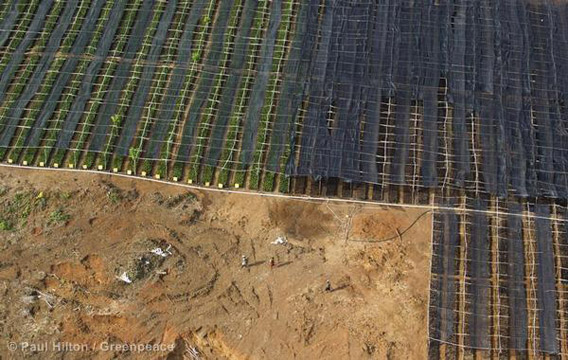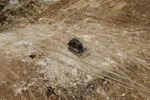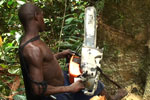
The beginnings of a palm oil plantation on newly deforested area in Pomio District. Photo by: Paul Hilton/Greenpeace.
Eleven percent of Papua New Guinea’s land area has been handed over to foreign corporations and companies lacking community representation, according to a new report by Greenpeace. The land has been granted under controversial government agreements known as Special Agricultural and Business Leases (SABLs), which scientists have long warned has undercut traditional landholding rights in the country and decimated many of Papua New Guinea’s biodiverse rainforests. To date, 72 SABLs have been granted—mostly to logging companies—covering an area totaling 5.1 million hectares or the size of Costa Rica.
“While logging has driven the spread of SABLs, oil palm development has been used as its justification,” the Greenpeace Report, Up for Grabs, reads. “However, only nine SABLs (311,000 hectares) are controlled by listed oil palm or biofuel companies. Most companies that hold subleases or development agreements over SABLs have no prior experience with agricultural development.”
Currently 75 percent of the land in questions is owned by foreign corporations, mostly in Australia and Malaysia. Companies from these two countries now own over 3 million hectares of Papua New Guinea forest, many of them for up to 99 years. Companies mostly chop down primary rainforest for raw logs to be shipped to China, causing log exports to jump 20 percent in 2011 alone.
The report dubs SABLs as “the greatest alienation of land from its people in the history of Papua New Guinea.” The Pacific nation is unique in that 97 percent of land is communally owned.
According to Greenpeace, lax governance, corruption, and predatory companies allowed for the massive land grab. Last year, following rising criticism, the government suspended any new SABLs and issued a Commission of Inquiry, whose report is set to go public later this year.
As many of the forests are logged, Greenpeace fears they will then be converted to oil palm plantations, a process which is already begun in parts of Papua New Guinea.
“A new code of conduct for the oil palm industry in Papua New Guinea is urgently needed to avoid the deplorable deforestation and indigenous rights abuses seen in [Malaysia and Indonesia],” the report warns.
SABLs have not only disconnected communities from their traditional land and imperiled biodiversity, but, according to the report, could also become a massive greenhouse gas source.
“If these SABLs were logged and then deforested, almost 3 billion tonnes of CO2 would be released—this is equivalent to Australia’s total CO2 emissions for the next six years.”
The report sees possible hope in a government change-over in Papua New Guinea. A recent agreement has ended a long stalemate over competing Prime Ministers.
“One of the first tasks of the new Papua New Guinea Government must be to suspend logging under SABLs and review and amend legislation so that communities are protected from the rapacious appetite of foreign-owned logging and agriculture companies,” Paul Winn, Forests Team Leader with Greenpeace, said in a statement.
Winn, who referred to SABLs as “national scandal” also urged Australia to provide “financial and technical assistance to develop a National Land Use Plan with the key objectives of protecting customary land rights and maintaining forest resources for future generations.”
A recent study found that between 1972-2002, nearly a quarter of the Papua New Guinea’s forests were already lost or degraded by logging, a situation which has likely only worsened in the last ten years.
Related articles
Palm oil giant to produce 100% segregated, RSPO-certified palm oil
(05/23/2012) 100 percent of New Britain Palm Oil Limited’s palm oil will be eco-certified, segregated, and fully traceable by the end of the year, reports the Roundtable on Sustainable Palm Oil (RSPO).
Police hired by loggers in Papua New Guinea lock locals in shipping containers

(04/16/2012) Locals protesting the destruction of their forest in Papua New Guinea for two palm oil plantations say police have been sent in for a second time to crack-down on their activities, even as a Commission of Inquiry (COI) investigates the legality of the concession. Traditional landowners in Pomio District on the island East New Britain say police bankrolled by Malaysian logging giant Rimbunan Hijau (RH) have terrorized the population, including locking people in shipping containers for three consecutive nights. The palm oil concessions belongs to a company known as Gilford Limited, which locals say is a front group for RH.
Big damage in Papua New Guinea: new film documents how industrial logging destroys lives

(08/29/2011) In one scene a young man, perhaps not long ago a boy, named Douglas stands shirtless and in shorts as he runs a chainsaw into a massive tropical tree. Prior to this we have already heard from an official how employees operating chainsaws must have a bevy of protective equipment as well as training, but in Papua New Guinea these are just words. The reality is this: Douglas straining to pull the chainsaw out of the tree as it begins to fall while his fellow employees flee the tumbling giant. The new film Bikpela Bagarap(‘Big Damage’) documents the impact of industrial logging on the lives of local people in Papua New Guinea.
Logging company fined $100 million for illegal logging in Papua New Guinea
(06/28/2011) In a landmark court decision a judge has slapped a logging company with a nearly $100 million (K225.5 million) fine for large-scale illegal logging. Last week, Malaysian timber company, Concord Pacific, was sentenced to pay four forest tribes for environmental destruction in the first ruling of its kind for Papua New Guinea.
Scientists urge Papua New Guinea to declare moratorium on massive forest clearing
(04/19/2011) Forests spanning an area larger than Costa Rica—5.6 million hectares (13.8 million acres)—have been handed out by the Papua New Guinea government to foreign corporations, largely for logging. Granted under government agreements known as Special Agricultural and Business Leases (SABLs), the land leases circumvent the nation’s strong laws pertaining to communal land ownership. Now, the Association for Tropical Biology and Conservation (ATBC), the world’s largest professional society devoted to studying and conserving tropical forests, is urging the Papua New Guinea government to declare a moratorium on SABLs.
5 million hectares of Papua New Guinea forests handed to foreign corporations

(03/23/2011) During a meeting in March 2011 twenty-six experts—from biologists to social scientists to NGO staff—crafted a statement calling on the Papua New Guinea government to stop granting Special Agricultural and Business Leases. According to the group, these leases, or SABLs as they are know, circumvent Papua New Guinea’s strong community land rights laws and imperil some of the world’s most intact rainforests. To date 5.6 million hectares (13.8 million acres) of forest have been leased under SABLs, an area larger than all of Costa Rica. “Papua New Guinea is among the most biologically and culturally diverse nations on Earth. [The country’s] remarkable diversity of cultural groups rely intimately on their traditional lands and forests in order to meet their needs for farming plots, forest goods, wild game, traditional and religious sites, and many other goods and services,” reads the statement, dubbed the Cairns Declaration. However, according to the declaration all of this is threatened by the Papua New Guinea government using SABLs to grant large sections of land without going through the proper channels.
Foreign corporations devastating Papua New Guinea rainforests

(10/21/2010) A letter in Nature from seven top scientists warns that Papua New Guinea’s accessible forest will be lost or heavily logged in just ten to twenty years if swift action isn’t taken. A potent mix of poor governance, corruption, and corporate disregard is leading to the rapid loss of Papua New Guinea’s much-heralded rainforests, home to a vast array of species found no-where else in the world. “Papua New Guinea has some of the world’s most biologically and culturally rich forests, and they’re vanishing before our eyes,” author William Laurance of James Cook University in Cairns, Australia, said in a statement.
Loss of old growth forest continues

(10/06/2010) A new global assessment of forest stocks by the U.N. Food and Agriculture Organization (FAO) shows continuing loss of primary forests since 2005 despite gains in the extent of protected areas. FAO’s Global Forest Resources Assessment 2010 reveals some 13 million hectares of forest were cleared between 2000 and 2010, down from around 16 million hectares per year during the 1990s. Loss of primary forest—mostly a consequence of logging—averaged 4.2 million hectares per year, down from 4.7 million hectares per year in the 1990s.
Photos: 200 new species discovered in 60-day expedition in New Guinea

(10/06/2010) A 2009 expedition to Papua New Guinea proves once again that the island-nation is as diverse in life as it is in human cultures. It took researchers with Conservation International (CI) and the local Institute for Biological Research (IBR) just two months to uncover a startling 200 new species: averaging more than 3 a day in the remote Nakanai Mountains and Muller Range rising from the island of New Britain, a part of Papua New Guinea. Half of the new species were spiders, but the team also found two new mammals, nine new plants, two dozen frogs, and multitude of insects. Most surprising was the discovery of at least two species so unique that they are likely to be assigned their own genus.













